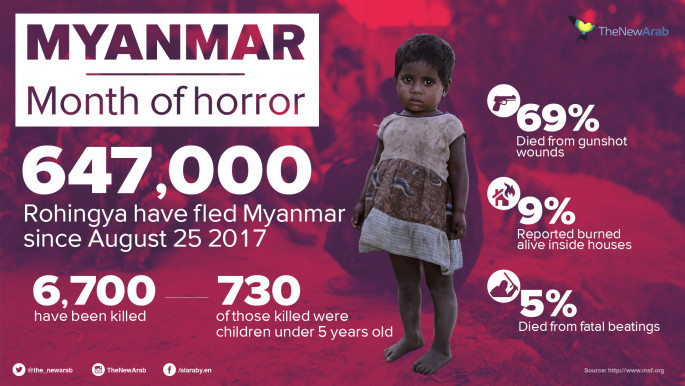Myanmar's Rohingya crisis has 'hallmarks of genocide', says UN
Myanmar military's violent operations against Rohingya Muslims bear "the hallmarks of a genocide" a UN special envoy on human rights in Myanmar found on Thursday.
Yanghee Lee said that while a definitive declaration could not be made until an international tribunal or court had weighed the evidence, there were "signs, and it is building up to that."
Lee visited refugee camps in Bangladesh and other areas in the region to discuss the Rohingya, a persecuted Muslim minority in Myanmar.
Northern Rakhine has been nearly emptied of its Muslim population since late August, when an army crackdown in Rohingya sent more than 750,000 refugees fleeing across the border to Bangladesh.
The UN, US and rights groups have accused Myanmar of carrying out a systematic ethnic cleansing campaign against the stateless Muslim minority, with Doctors Without Borders (MSF) estimating that at least 6,700 Rohingya were killed in the first month of violence.
While specifics were not given, Lee mentioned that reports of the five mass graves found need to be investigated, "and this is why we've called for a fact finding mission, and access for international media" to the areas in the northern Rakhine state.
Lee added that Myanmar's actions were "amounting to crimes against humanity" and that "these are part of the hallmarks of a genocide".
"I think Myanmar needs to get rid of this baggage of 'did you or did you not,' and if proven that they did, then there has to be responsibility and accountability. No stones must be left unturned because the people, the victims, the families of the victims definitely deserve an answer," she said.
Human Rights Watch released a report late last year documenting how Myanmar's security forces committed widespread rape against women and girls as part of a campaign of ethnic cleansing against Rohingya Muslims in the Rakhine State.
Myanmar's authorities have continued to deny the growing documentation. In September, the Rakhine state border security minister rejected the reports saying: "Where is the proof? Look at those women who are making these claims – would anyone want to rape them?"
Scenes of dispossessed Rohingya fleeing en-masse as their villages in Rakhine State burn behind them have provoked outrage around the world.
An internal investigation conducted by the Burmese military was released, clearing themselves over the reported Rohingya atrocities. The report, described as 'white-washing' by human rights groups prompted the US secretary of state to call for a "credible" investigation.
The Rohingya have faced discrimination for decades in Buddhist-majority Myanmar where they are denied citizenship and denigrated as illegal 'Bengali' immigrants.
Meanwhile, two Reuters reporers remained in jail after being accused of breaking the country's official secrets act.
Wa Lone and Kyaw Soe Oo had both been following the Rohingya killings. Their arrest was tantamount to further proof of a government cover up of massacres in Rakhine province, human rights groups have argued.




![Widespread famine is imminent in Gaza [Getty Images]](/sites/default/files/styles/image_330x185/public/2024-03/GettyImages-2015647000.jpg?h=199d8c1f&itok=mJWWP_Td)